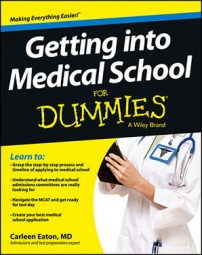If you’re sure about becoming a physician, consider pursuing a baccalaureate and medical degree through a combined Baccalaureate/MD (Bacc/MD) program. Acceptance into a Bacc/MD program means you’ve secured not only a seat in an undergraduate institution but also provisional acceptance into a medical school.
Some osteopathic medical schools offer Bacc/DO programs. Check out the Osteopathic Medical College Information Book from the American Association of Colleges of Osteopathic Medicine (AACOM) for a list. For a list of Bacc/MD programs, see the Medical School Admission Requirements (MSAR) guide.
What to expect from a Bacc/MD program
Baccalaureate/MD programs last from six to eight years. The first two to four years usually focus on undergraduate course work, although in some programs, elements of the medical school curriculum are integrated throughout the program.
Accelerated (six- or seven-year) programs are year-round and/or allow some of the medical school course work to count toward undergraduate requirements. The pace isn’t as intense in an eight-year program because students spend four years in undergraduate studies and four years in medical school − the same amount of time earning each degree alone takes.
Eight-year programs therefore provide a more typical premedical student experience and generally give greater latitude in course choices compared with shorter combined programs.
Signing on to a Bacc/MD program doesn’t necessarily mean you’re at the same institution for your entire education. In fact, the undergraduate and medical school components of the program often take place at different institutions. One factor to consider when choosing a Bacc/MD program is whether you prefer to move on to a new place to attend medical school or settle in at one institution for the long haul.
When you’re accepted to a Bacc/MD program, your admission to the medical school may be provisional. The school guarantees a seat for you in its affiliated med school as long as you hold up your end of the bargain.
For example, you may be required to maintain a minimum GPA during the undergraduate component of the program and/or achieve a certain minimum score on the Medical College Admission Test (MCAT). The criteria for advancement vary significantly among programs, and some don’t require students to take the MCAT at all.
Advantages of a Bacc/MD program
Bacc/MD programs are highly selective because they offer some significant benefits when compared with the usual path from high school to med school. These perks may include the following:
The opportunity to complete college and medical school in fewer than eight years: Six- and seven-year programs save participants one or two years of time as well as cut down on educational costs.
A reserved seat in medical school: To matriculate into the medical school portion of a joint program, you may have to meet particular requirements as an undergraduate. However, your place is still more assured than that of your peers who are several years from even applying for admission to med school.
The luxury of needing only a minimum score on the MCAT or avoiding the test completely: The possibility of skipping the MCAT is a major draw for some students. Studying for the MCAT can be a major drain on your time, and not having to take it frees you up to pursue other interests and eliminates one of the biggest stressors premedical students face.
Some Bacc/MD programs that do require the MCAT set the bar relatively low, requiring that students score only in the high 20s to advance to med school. (A typical score for traditional med school acceptance is more like a 31.)
Freedom from worrying about how your choices for classes and activities will look to med school admissions committees: You can pursue your interests knowing that you won’t have every grade, activity, and choice of class picked over by admissions officers in a few years’ time.
You still need to do well in your courses to prepare for medical school (and to meet any GPA requirements set by your program), but going from a 3.7 to a 3.6 doesn’t create a crisis the way it may seem to for your premed friends.
Early clinical exposure and access to specific volunteer, research, and other activities for students in the program: Some programs integrate patient contact into the program as early as the first semester. In addition, many Bacc/MD programs offer medically related volunteer positions, seminars, workshops, and/or research opportunities for their students.
Drawbacks of a Bacc/MD program
Even though you might skip the MCAT or cut a year or two off school, there are some drawbacks to Bacc/MD programs:
Fewer options for classes and majors: Some Bacc/MD programs have limitations on the major you may pursue and/or course selections.
Complications if you decide to leave the program before completing your undergraduate degree: Six- or seven-year programs may not award the undergraduate degree until after the first or second year of medical school because they count some preclinical medical school courses toward completion of a BA or BS.
If you decide you don’t want to complete the entire program, you’ll have to determine which classes count as undergraduate credits and what additional courses you may need to take to get a bachelor’s degree at your current institution or another one.
Strict rules about where you can apply to med school: At some programs, a student forfeits provisional admission to the program’s med school if she decides to apply to other medical schools. Before committing to a Bacc/MD program, check its policy to find out whether you can hold onto your guaranteed seat if you decide to apply to outside med schools.
A compromise in the undergraduate institution or medical school that you attend: Finding the perfect college or med school is hard enough, so it’s no surprise that going to a program that combines the two may require you to compromise on one or the other.

